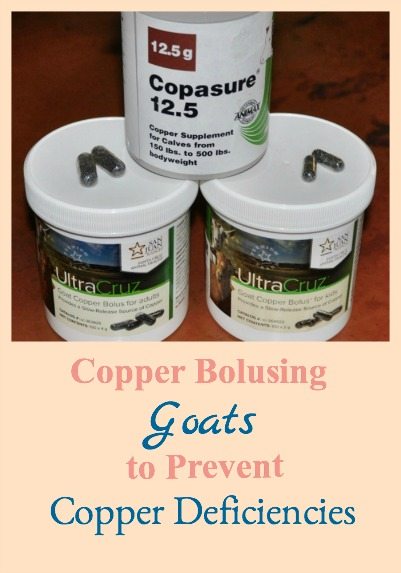What Causes Copper Deficiencies?
Copper deficiency in ruminants has been a documented problem in many regions (North America, Australia, Europe, etc.) 
In addition to copper deficiencies in the diet, copper deficiency can be brought on by copper inhibitors in the diet such as iron, sulfur, molybdenum, and zinc that reduce copper availability. Also, alfalfa is a crop often fed to goats that is well known for its susceptibility to copper deficiency; and wheat, barley, and oats can also be deficient. Whatever the source, a copper deficiency can cause serious problems.
Problems Caused & Signs of Copper Deficiency
Problems associated with copper deficiencies in goats include severe anemia, stillborn kids, mastitis, osteoporosis, and many other ailments. Copper is essential for proper development of the central nervous system, correct bone growth, and hair pigmentation. Physical signs that a goat is deficient include thin-stiff coats, sparse tails, pale colored rings around eyes, reduced hair on the spine, oddly bent legs, or most commonly – loss of hair color.
Preventing Copper Deficiencies
In 1994, copper bolusing was introduced to the US from New Zealand, and today is a very popular method of preventing copper deficiencies. Copper boluses are gelatin capsules containing thousands of tiny copper oxide needles. Copper oxide needles are fine copper wire, and are non-toxic when given orally. The capsules dissolve in the goat’s rumen and the needles lodge in the abomasum where they slowly dissolve and provide copper. Copper bolusing is generally done at 4 to 6 month intervals to provide continuous protection against copper deficiency. Studies have shown that copper levels start decreasing rapidly after about 4 months.
The dose for copper bolusing is 1 gram of copper oxide in the bolus form per 22 lbs. of goat weight. Today, copper bolus capsules can be found in 2, 4, and 12.5 gram sizes and can be administered using a simple bolusing tool. The idea is to get the goats to swallow the capsule, rather than chew it, since the oxide needles are supposed to lodge in their stomach and dissolve slowly.
Darin Wall says
What do you think about goat feed. Good or Bad for goats. I have a goat as a pet and she eats very little vitamins I give her. She is about 10 months old . Do I need to worry about copper deficiency with her since she is a pet. I was told that she is a Nubian goat .
Thank you
liz says
Great information, goats are on my someday list and I love to be prepared! Thanks for sharing on Homestead Blog Hop 🙂